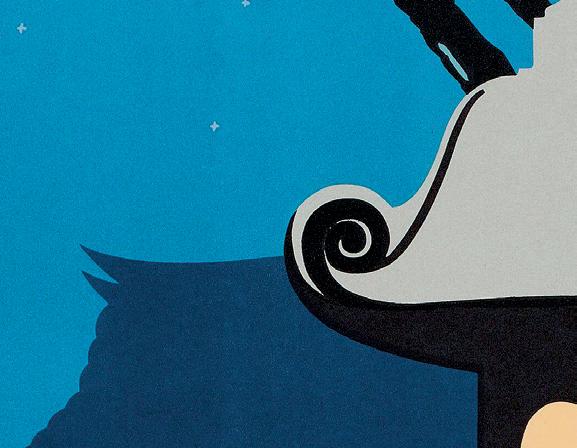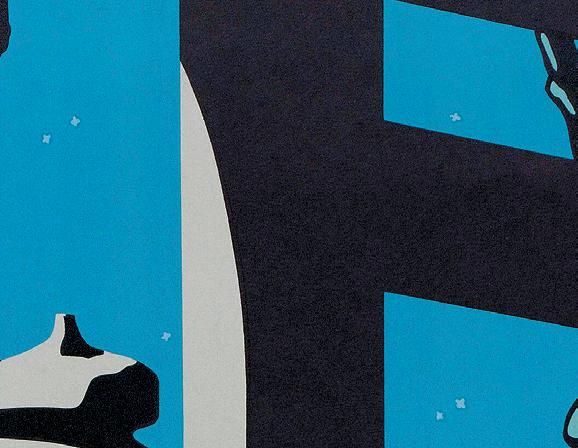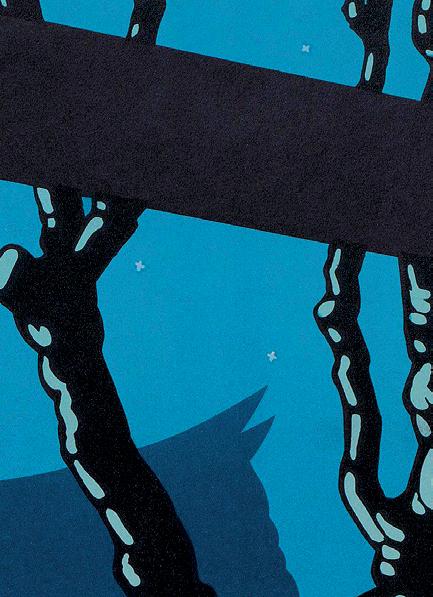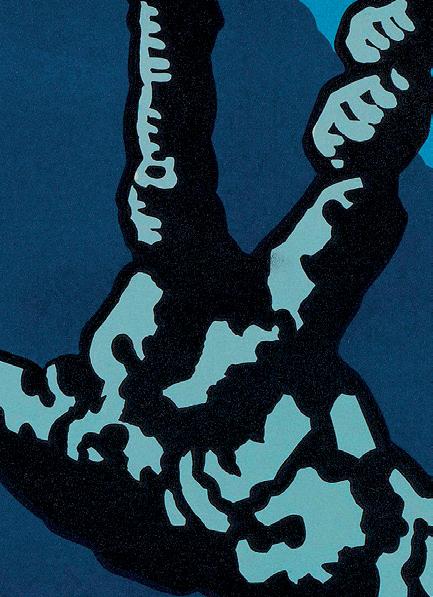Seich ō Matsumoto
A Quiet Place
UK | USA | Canada | Ireland | Australia
India | New Zealand | South Africa
Penguin Classics is part of the Penguin Random House group of companies whose addresses can be found at global.penguinrandomhouse.com.
Penguin Random House UK
One Embassy Gardens, 8 Viaduct Gardens, London SW 11 7BW
penguin.co.uk
A QUIET PLACE by Seicho Matsumoto
Original Japanese edition published by Kobunsha Co., Ltd, 1971
Republished in the COMPLETE WORKS OF MATSUMOTO SEICHO vol. 23 in 1974
First published in the United Kingdom by Bitter Lemon Press 2016
Published by Penguin Classics 2025
001
Copyright © SN Kikaku
Translation copyright © Louise Heal Kawai, 2016
This English-language edition published by arrangement with Bungeishunju Ltd., Tokyo through Tuttle-Mori Agency, Inc., Tokyo
The moral rights of the author and translator have been asserted
Penguin Random House values and supports copyright.
Copyright fuels creativity, encourages diverse voices, promotes freedom of expression and supports a vibrant culture. Thank you for purchasing an authorized edition of this book and for respecting intellectual property laws by not reproducing, scanning or distributing any part of it by any means without permission. You are supporting authors and enabling Penguin Random House to continue to publish books for everyone.
No part of this book may be used or reproduced in any manner for the purpose of training artificial intelligence technologies or systems. In accordance with Article 4(3) of the DSM Directive 2019/790, Penguin Random House expressly reserves this work from the text and data mining exception.
Typeset by Jouve (UK ), Milton Keynes
Printed and bound in Great Britain by Clays Ltd, Elcograf S.p.A.
The authorized representative in the EEA is Penguin Random House Ireland, Morrison Chambers, 32 Nassau Street, Dublin D 02 YH 68
A CIP catalogue record for this book is available from the British Library
ISBN : 978–0–241–74420–8
Penguin Random House is committed to a sustainable future for our business, our readers and our planet. This book is made from Forest Stewardship Council® certified paper.
A Quiet Place
Tsuneo Asai was on a business trip to the Kansai region when he heard the news.
Around 8.30 in the evening, he was having dinner and drinks in the banquet room of a high-class restaurant with businessmen from the food processing industry. Asai was a section chief in the Staple Food Department of the Ministry of Agriculture and Forestry. He’d arrived in Kobe the day before, accompanying the ministry’s brand-new director general on a tour of inspection. It had only been a month since Director-General Shiraishi had been promoted from a different department, and he wasn’t very familiar with the practicalities of the job yet. For the past couple of days, he and Asai had been visiting canning facilities and ham-processing plants in the Osaka–Kobe area, and were off to Hiroshima the next day. This evening they were enjoying the hospitality of some of the local business owners.
The evening was starting to wind down. Shiraishi, who was three years Asai’s senior, was sitting across from the chairman of the Food Manufacturers’ Association. The two men were discussing golf. The director general was known for his low handicap. In addition, he was an expert at shogi – Japanese chess – and Go, and a legend within
the ministry for his mah-jong skills. Asai was at his side, sipping sake, pretending to be absorbed in his boss’s story. He believed that listening faithfully to one’s manager’s idle chit-chat was a mark of respect. Shiraishi’s voice was getting louder, oiled by the whisky he was drinking. He’d made director general by the age of forty-five – a rapid rise through the ranks. Unlike Asai, Shiraishi had graduated from the law department of the elite Tokyo University, and was a favourite of the vice-minister, leader of one of the ministry’s main political factions.
In advance of the personnel change, Asai had approached the manufacturers to warn them that the incoming director general was only planning a two-year –well, maybe as little as a year and a half – temporary stopover in the post before transferring back into one of the ministry’s mainstream departments, and wouldn’t be putting much effort into the job.
“He won’t be at all familiar with the business side of things,” Asai explained. “But don’t worry; he’ll rely on me for everything. Leave him to me. Now, it’s possible he might try to pull off some sort of impressive stunt to draw more attention to himself, but I’ll be right there as a guide. I’ll be able to rein him in, don’t you worry.”
The manufacturers, anxious to gain their government certification, were all too happy to defer to Asai’s veteran experience. Asai had developed a pretty cosy relationship with them, but he never let it show while Director-General Shiraishi was around. Shiraishi had spent his free time at Tokyo University brushing up on his Go, shogi, mah-jong and golf; Asai, the kid from a poor family who’d struggled to graduate from a small private university and work his
course, but what could possibly be so urgent for her to call the restaurant?
After about a minute, Asai rose slowly from his floor cushion. His boss was facing away from him, in conversation with the chairman. The geisha glanced his way, but quickly turned her attention back to the director general. Around twenty-seven or -eight, round-cheeked, she was definitely Shiraishi’s type.
Outside the party room, Asai followed the waitress along the corridor, around two corners to a glass-doored telephone booth. The receiver was off the hook.
“Hello, it’s me,” he began, but there was no one on the other end. His heart began to beat harder. He could hear other voices in the background, too faint to make out the words, but there was definitely some sort of commotion. Close by, he thought he could hear a woman sobbing. He recognized it as the voice of his sister-in-law, Miyako. That was why there had been no response – Miyako was in tears.
“Miyako! What’s the matter?” There was a slight tremor in his voice. He realized that something must have happened to Eiko for her not to come to the phone in person.
“Eiko’s…”
Asai couldn’t really follow the rest. Miyako was so emotional it was hard to tell whether she was laughing or crying. Then he thought he made out the word “dead”.
“What?” he asked. “What did you say?”
“Eiko’s dead.”
“Dead? Are you sure?”
A waitress passed by in the corridor outside the glass booth. The door was tightly closed, and she didn’t even glance at him.
“When?”
Miyako’s speech was distorted by a huge wave of sobbing.
“Just over four hours ago.”
She’d been dead for more than four hours, and he was only just hearing about it? When he left for his trip he’d made sure to write down his schedule and the telephone numbers of the hotels he’d be staying at. Miyako would have called the hotel and been given the number of the restaurant. She should have called him here right away. There must have been an accident – that would have caused a delay. And it couldn’t have happened at home –she must have died elsewhere, otherwise Miyako would have called him immediately. But if they’d taken her to hospital, surely someone would have called to let him know.
“Was it a traffic accident?” he asked.
“It’s me.” Eiko’s father was on the line. “No, not a traffic accident.”
So his father-in-law had already arrived from the suburbs.
“She had a heart attack. It was very sudden.”
Asai’s seventy-year-old father-in-law sounded shaken. He couldn’t stop coughing.
“She was walking in the street, was suddenly overcome with pain, and collapsed in a nearby shop. The owner called Miyako and she got a taxi straight there, but it was already too late.”
“Did the shopkeeper call an ambulance?”
Asai was struggling to keep his emotions under control.
“No, she didn’t. There was a private clinic about two hundred yards away, so she got the doctor to come right over, but Eiko’s heart had already stopped beating.”
Eiko had a weak heart. She’d already suffered a mild heart attack two years ago.
“Where is she now?”
“They brought her back to the house about an hour ago. Miyako called your hotel to find out where you were.”
He could still hear Miyako weeping, and what sounded like his brother-in-law in the background, too.
“So what train will you be coming back on?” Eiko’s father asked.
“There won’t be any more bullet trains this evening. I’ll fly back if I can make it to the airport in time. Otherwise it’ll be the overnight train that gets into Tokyo in the morning.”
“We’ll all be waiting. I just can’t believe it. It’s such a shock. You should…”
His father-in-law had been going to tell him to try to stay calm and come home, but his voice petered out. It was almost as if the pain of causing trouble for his son-in-law was harder to deal with than the death of his daughter.
Asai left the telephone booth and called over one of the waitresses.
“Can I make it to the airport to catch a Tokyo flight tonight?”
The waitress folded back the violet-coloured sleeve of her kimono and looked at her wristwatch.
“It’s almost ten past nine now. The last flight is at nine thirty, so I doubt it.”
The restaurant was used to hosting customers from the capital, so they knew the flight times by heart.
“Do you need to get back right away?”
“Yes. What about an express train?”
He carefully placed the bowl of untouched ochazuke on the table, pushed himself up to a kneeling position and shuffled a little closer to the director general.
“Mr Shiraishi, sir,” he said in a low voice, “I am very sorry to have to tell you —”
His boss inclined his head almost imperceptibly in Asai’s direction.
“I’m hoping to keep this private from the rest of the party…”
Things were not quite as lively as when the alcohol had been served earlier, but the party was still in full swing.
“Anyhow, I just received a phone call from my home in Tokyo. It seems my wife passed away unexpectedly.”
Shiraishi didn’t appear to have heard properly, and leaned in a little closer, a puzzled expression on his face.
“A heart attack. A few hours ago.”
This time, the director general understood. His eyes widened and he hurriedly placed his rice bowl on the table. His gaze darted quickly around the room before settling on Asai’s face.
“Really? Well, I’m —” His voice had taken on an appropriately sombre tone.
“It’s true, I’m afraid,” Asai added, in barely more than a murmur. “I just heard it from my father- and sister-in-law.”
“Was she in poor health, then, your wife?” asked his boss, adjusting his own voice to Asai’s level.
“No, sir, she was in good health. She had a sudden heart attack while out walking, and collapsed in a nearby shop. She died on the spot, apparently.”
“Well, that’s, er…”
As Asai had asked him to keep the news from the rest of the party, Shiraishi lowered his head slightly. His earlier look of irritation had quickly turned to a mixture of sympathy and unease.
“Well, you’d better get back to Tokyo straight away.” He issued the order in a low voice.
“Oh, thank you, sir. I’m terribly sorry that I won’t be able to be of service to you any longer on this trip.”
“Oh, please. Don’t worry about it. Well…” He checked his watch. “There won’t be any more flights tonight.”
“Right.”
“Are there any trains?”
“I heard from the restaurant staff that there’ll be an overnight train at 10.15.”
“Well, that doesn’t give you very much time. I’ll be fine. You’d better get on your way.”
“Thank you very much. I’m so sorry for all the inconvenience I’m causing you.”
“No, don’t be. It’s nothing at all.”
The food-processing reps were eating and drinking as normal, but they were throwing the occasional glance in the direction of the two men speaking in whispers. The geisha had taken her cue to leave, and was quietly chatting with one of her fellow entertainers.
“I’m very sorry about this.”
“I’ll come and pay my respects to your family once I’m back in Tokyo.”
“Oh no, sir, that’s not necessary… Well, I appreciate it. I know how busy you are.”
“Anyway, you’d better get going. After you’re gone, I’ll find the right moment to explain to everybody.”
“Oh no, sir. Please don’t trouble yourself. I’ll call ViceChairman Yagishita out into the hallway, and explain the situation to him. I’ll get him to tell the others.”
“Oh, all right then.”
The director general accepted without hesitation. He looked decidedly relieved not to have to perform such an unpleasant task himself.
“About the rest of the tour, sir. For the Hiroshima inspections, shall I ask the director of the General Affairs division at the local office to accompany you? If that’s acceptable to you, I can ask Yagishita to arrange it.”
“Please don’t worry about all that. I’ll manage just fine.”
“But if we don’t sort it out right away —”
“Never mind. Just get on your way. You still have to go and pick up your things from the hotel, don’t you?”
“Oh, yes… Well, I suppose I’d better take my leave.”
Now everyone had noticed that something was going on. Thirty pairs of eyes followed Asai as he got to his feet. He shot Yagishita a look and hurried out into the corridor. Yagishita followed right behind.
The vice-chairman was astounded to hear Asai’s story. To save time, the two of them talked on their way towards the exit.
“I thought it was a bit strange, all that whispering between you and the director general, but I never imagined it could be anything so awful. I don’t know what to say.”
Yagishita lowered his balding head and bowed deeply to Asai.
“Thanks. It was a complete shock.”
“It must have been. Like a bad dream, I suppose. When I tell everyone I reckon they’ll all be pretty shocked too.”
“I didn’t think it appropriate for me to announce it during dinner, but could you find the right moment and let everyone know?”
“Of course I will, don’t you worry. But Mr Asai, there was no need to hold back. We’ve all known you for years! You should feel at home here.”
“I’m sorry – I do have one more request. After I leave, the director general will be travelling by himself. I don’t suppose you could suggest someone to look after him? It’s too late to get anyone from the ministry, but tomorrow morning could you give the Hiroshima office a call and get the director of General Affairs to meet him at the station and stay with him for the rest of the trip?”
“Got it. But you really shouldn’t be worrying about work at a time like this.”
There was pity in Yagishita’s voice.
“No, no. It’s fine. It’s my job, after all. I have to hand over the reins in a responsible manner. I can’t be seen to get distracted by personal matters.”
“But your wife has passed away. It’s completely different.”
“I suppose so. But I still have to make a distinction between personal and professional matters. After I leave, the director general is going to be all alone, and that’s not going to make him look good at all.”
“Yeah, well, I suppose you’re right, but —”
“Anyway, could you do that for me?”
“Sure. No problem. Have a safe trip home!”
Asai stopped walking for a moment and leaned to whisper in Yagishita’s ear.
“What do you think about the girl sitting across from Mr Shiraishi? Do you think anything’s going to come of that?”
Yagishita looked stunned. Apparently, when it came to his bosses, nothing escaped Asai’s attention.
“Mr Asai. You’re not worrying yourself about that sort of thing at a time like this, are you?”
It wasn’t until much later that Asai finally began to recover from the shock. Rattled around by the movement of the overnight train, he lay awake and began to think. Where had Eiko been when she’d had the heart attack? He’d forgotten to ask.
Following Eiko’s funeral, Asai observed the seventh-day Buddhist memorial service, but once that was over the house felt empty. It’d be a long time before everyone would get together again. There’d be the next memorial on the first anniversary of her death, but Asai wasn’t sure how many of Eiko’s relatives were likely to turn up. He and Eiko had no children, so it felt as if the family line had ended with her death.
Asai and Eiko’s marriage had lasted seven years. They’d married a year after Asai’s first wife had passed away. He’d been thirty-five, and she eight years his junior. At twentyseven, it was Eiko’s first marriage. The matchmaker told him that she’d been very picky early on about who she’d accept a marriage proposal from, and that gradually her chances of finding someone had faded. When they first came face to face, Asai had guessed that was true. She wasn’t all that great-looking, but he was attracted by her cheerful smile.
Asai had expressed a strong interest in Eiko, perhaps because his first wife had been rather plain-looking. However, the matchmaker didn’t bring him an immediate acceptance of his proposal. Eiko had hesitated. He hadn’t been sure if it was something to do with her
age – twenty-seven was late for a first marriage – or if it had been a problem for her that it was his second. Asai also knew he wasn’t exactly a great looker himself; he’d never been popular with the ladies. The only thing really going for him was the stability of his job as a civil servant, but even that didn’t pay a great salary.
Finally, after keeping him in suspense for a good while, Eiko had agreed to marry him. Asai loved her. His second wife was much younger and more immature than his first, and he treated her more like a favourite child. Sometimes the age difference felt a lot closer to a dozen years.
Eiko, for her part, rather enjoyed being spoiled by her affectionate husband. It wasn’t uncommon for her to spend two or three days at a time lying on the sofa, claiming to be too tired to do any housework. Asai never complained. He’d go out shopping and do all the cooking and cleaning himself.
Whenever she was feeling fatigued, Eiko wouldn’t let Asai anywhere near her. She’d never been particularly into sex. This didn’t mean she wasn’t affectionate to her husband – she just wasn’t very assertive in bed. It was a little disappointing to Asai, but it didn’t stop him from adoring his young wife.
Eiko was very sociable and loved to spend time with friends. This aspect of her personality contrasted strongly with how quiet she was at home. She had two completely different sides. Asai often wondered if she was bored staying at home with him. She certainly came to life whenever she went out somewhere.
Mostly she spent time with women she’d known for years, and friends of those friends. At the beginning they’d all
It was about two or three years ago that Eiko had turned to her husband and asked, out of the blue, “Do you think I’m sexy?”
Asai had asked if someone had told her she was, to which she’d replied that a fellow haiku poet had told her that she was very sexy – not in any vulgar way, but that she had a kind of glamour about her. She’d clearly been delighted.
“Was it a man or a woman who told you that?” Asai was very conscious of the fact that there were far more men than women in her haiku circle.
“Of course it was a woman! I never talk to the men about anything but poetry. There’s no one who’d say anything like that to me. But this woman said that if she could see it, then it must be obvious to men too.”
Because Asai was around her day in day out, he hadn’t really noticed, but when Eiko had told him this he’d seen what she meant. The lines of her figure had softened and rounded. She’d always been charming, but as she approached her mid-thirties that sweetness had changed to a more mature sexiness.
“Ugh. I had a bad experience today. One of the women in my haiku circle told me she’d always assumed I was a bar hostess or something. She’d heard from one of my friends that I wasn’t, but found it hard to believe. Is that how people see me? I’m going to have to start wearing frumpier clothes from now on.”
But all the frumpy outfits in the world wouldn’t have disguised her sex appeal; they’d have simply served to highlight the sexiness beneath the surface. To be honest, it had nothing to do with the clothes – it was her body.
What had always been her sociable and open behaviour now came across as a little flirty. Asai saw it after this conversation, even in the smallest gesture.
They say a woman in her thirties is in the prime of her life, thought Asai. It was only natural that her body would change. This exact topic had come up when Asai had been out drinking with his colleagues after work. One of his colleagues had claimed that there was nothing natural about a thirty-something woman who started to look sexier; he believed her increased sensuality was achieved through experience. The rest had agreed. There was only one way that a woman’s sexuality could mature, and that was by having more sex.
But Asai had been reluctant to agree. Sex with his own wife couldn’t possibly be responsible for her increased voluptuousness. Not only was it very infrequent, but there was nothing wild or adventurous about it either. He knew from frank conversations over drinks that his own sex life was only about a tenth of the frequency of his colleagues’. Assuming this group was an average cross section of the general public, he’d realized he was way, way below the norm. Eiko just wasn’t interested.
To make matters worse, about two years previously, Eiko had suffered a heart attack. The unexpected pain in her chest had abruptly drained all the colour from her face, and she’d broken out in a cold sweat. She’d made it to the hospital in time, and the doctor had diagnosed a mild coronary. After a week in hospital, she’d made a full recovery, but ever since then she’d been even less keen on Asai’s attentions in bed. She’d read in some medical journal that a second heart attack was likely to be fatal,
































